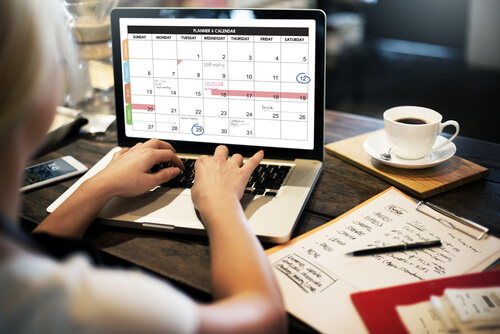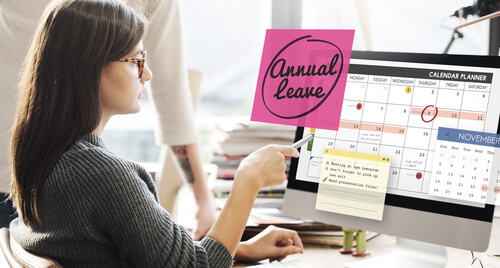Burnout is a state of physical and mental exhaustion where sufferers experience depression-like symptoms as a result of feeling over-worked and stressed.
Whilst it’s commonly associated with the workplace, it can develop from other aspects of life, such as students can feel burnt out from studying for their degree.
Although you can feel burnout at any time during the year, it’s more prominent in winter due to several factors like the weather getting darker with less hours in the day, there’s also other pressures such as the holiday season and the current cost of living crisis to add into the mix.
It’s no doubt that all of this can make young professionals feel mentally drained from their job and other stressors in their daily life.
We’ll be discussing the common burnout symptoms within this post, as well as tips and tricks to help you if you’re experiencing these feelings.
Carry on reading to find out!

Causes Of Winter Burnout
There are many causes of winter burnout, with the most common being feelings of overwhelming stress.
Such as, if an individual is working too hard, constantly busy and taking on too many tasks than they can handle at their job.
It could also be that an individual is experiencing unfair treatment at their job or not receiving enough support.
Many employees experience burnout so you’re not alone if you’re feeling this way.
According to one study 88% of UK employees have experienced some form of burnout over the last two years.
Whilst other research suggests that stress levels are highest amongst 18-24-year-olds.
Another reason why someone may feel burnout is a lack of a health work-life balance where they are spending most of their time working, rather than spending time socialising, practising self-care or doing things that interest them.
When it’s all work and no play, an individual will quickly become burnout from their job role!
As we mentioned earlier, the reason why burnout is so common during the winter months is due to the lack of sun exposure and their being less hours in the day.
Negative feelings tend to intensify during these colder and darker months, and workers may feel like they’re “going to work when it’s dark and coming home when it’s dark”.
In additional, there may not be as much social activities to look forward to due to the weather, or people saving up for the Christmas season too, especially with the current cost of living crisis.
Winter burnout can also be experienced through remote working, especially during the winter months due to employees not getting out of the house or socialising as much.
If someone’s home space is also their workplace it can have negative impacts on their mental health too.
Signs Of Winter Burnout
Now you know some of the common causes of winter burnout, below we have discussed some of the mental and physical signs to watch out for.
Although, symptoms can be different from person to person.
- Reduced work performance
- Loss of enthusiasm
- Self-doubt
- Low mood
- Feeling overwhelmed
- Sleep problems or insomnia
- Low energy levels, feeling tired or drained
- Frustration
- Procrastinating and taking longer to complete tasks
- Struggling to concentrate
- Irritability or impatience
- High anxiety levels
To find out more about symptoms of burnout view the Mental Health UK website.
Tips & Tricks For Winter Burnout
If you think you’re suffering from winter burnout there are things you can do to overcome these feelings.
Or, if you’re looking for ways to avoid winter burnout there are some things you can do.
Take a read of our 7 tips and tricks to find out!
1. Adjust Your Schedule
Our first tip for dealing with winter burnout is to adjust your schedule to ensure that you have a healthy work-life balance.
If you regularly work overtime or don’t give yourself enough time outside of work to unwind, then it’s no doubt that you’ll feel mentally exhausted.
Whilst the weather may be colder and darker, you can still get out and about when you’re not working!
The best thing to do is look at your daily schedule and see if there is anything you can do to change it.
Such as if you’re getting home when it’s dark and missing out on going outside, you could wake up earlier in the morning or go for walks on your lunch break.
If you work from home or if it’s possible to do this at your place of work, you could start the day earlier so that you finish earlier and have more ‘sunlight’ hours to make use of.
2. Prioritise Your Personal Life
Similarly, to what we’ve just mentioned, it’s so important to ensure that you have time to yourself outside of your working hours.
So, make use of your time during the week when you finish work and on the weekends.
You shouldn’t work outside of your normal working hours too often, or at all if it’s possible!
This does depend on your job role though, such as if you’re a lawyer or a teacher for example, it may be expected of you to carry out additional work at home.
No matter the field of work you work in, try your best to indulge in self-care and prioritise your personal life when you get home and switch off from your job whether it’s watching your favourite TV shows, cooking up a nice dinner or spending time with family and friends.
If you’re feeling mentally and physically drained, it may feel like a chore to socialise with others, but you should make time for your loved ones as it will improve your mood!
You’ll probably notice some big differences to your work-life balance from these small changes and you’ll feel less burnout!
3. Take Regular Breaks
A further way to try and reduce the feelings of burnout is to ensure that you’re taking regular breaks throughout the day.
We’re not saying you should go and take a half an hour break multiple times a day, but make sure that you’re using up your break entitlement every day and not working through your lunch or dinner break.
If you start to feel overwhelmed during the day, take 5 minutes to yourself to have a rest and you’ll probably feel a lot more motivated and ready to take on the tasks at hand!
When we say take breaks, we don’t just mean in your working hours, but when you get home too.
You should take breaks from technology and reduce your screen time when you get home, as this can stop you from properly unwinding and prevent you separate yourself from your job.
This is especially important if you’re someone who checks your work emails or notifications too much when you’re at home!
4. Get Enough Sleep
As you probably know, stress and sleep are closely linked and have a reciprocal relationship to one another.
Such as, a common cause of lack of sleep or poor-quality sleep is linked to high levels of stress, but high levels of stress also cause you to feel stressed – it’s hard to find a middle ground!
If you’re experiencing winter burnout, you may lie awake at night concerned your job, your finances or other worries which can impact your ability to fall asleep.
A way to combat this is to spend time de-stressing and relaxing before you go to bed and through practicing self-care methods.
Whether it’s watching some telly, having a hot bath or shower or doing a hobby you enjoy, make sure you schedule some chill time before bedtime even if you’re knackered.
You should try and sleep for 8 hours a night if you can, you’ll feel ready for the day ahead and you won’t feel exhausted before you even start work.
Plus, try to develop a good sleep routine where you’re sleeping at the same time every day and waking up at the same time.
Although this will be different on the weekend for the all-important lie ins, having a sleep routine can have a massive impact on your energy levels and prevent you from feeling fatigued!
5. Exercise Regularly
Burnout can have an impact on both your mental and physical health and it’s something many of us suffer from.
A great stress-reliver to help improve your wellbeing is to exercise regularly as your body will produce endorphins and mood-boosting hormones.
We know, it’s hard to motivate yourself to exercise when the weather is cold, wet and windy in the winter but even just 10 minutes a day can help you feel a whole lot better and help take your mind off the things that are bothering you.
Going the gym can also give you something to do and get you out of the house during the winter months when your social life may be lacking.
You may even meet new people from taking part in fitness classes at the gym too.
You don’t have to go to the gym to get some daily exercise in either, you can do some indoor exercises at home like yoga or fitness videos!
6. Plan Time Off
We know, it’s hard to try and plan time off with your annual leave entitlement, especially during the winter months when you’ve used up a lot of it during the summer.
However, if you can try and plan some time off to look forward to. It can be a real motivator to have some nice things planned, and sometimes you just need the time off to recharge your batteries and to have some time for your mental or physical health.
We’re not saying you need to take loads of time off, but even having a long weekend can be really help prevent feelings of burnout.
You’ll probably feel a whole lot better when you return to work, and you’ll be more productive so it’s a win win!
If you’re curious as to how you can stretch your annual leave further in 2023, have a read of our blog.
7. Ask For Help
Our final tip for dealing with winter burnout is to ask for help, you can’t deal with these feelings by yourself and there are things that can be done to change the mental, physical and emotional state that you are experiencing.
Firstly, you could ask for help from your workplace through speaking to your manager if you are feeling overworked.
Such as if you are working overtime a lot or if you’re struggling to cope with your workload, it may be that some tasks can be given to someone else to make things more manageable.
There are various changes than can be made to your daily job and your employer should want to prioritise your mental and physical health too.
At the end of the day, they’ll want you performing the best that you can, so it’s best to speak up and see what the best outcome is.
It’s not just your workplace that you should ask for help from either, if your mental or physical health is taking a toll as a result of burnout then speak to your GP.
View the NHS website to find some helpful resources on dealing with stress and feelings of burnout.
If you’re experiencing burnout, it can feel easier said than done to implement changes to your daily life, but it’s important for your mental and physical health to try and take these tips and tricks on board.
Remember, try not to let your job impact your life too much, and if it is try to consider whether your current role and responsibilities are worth the way it’s making you feel.
It might be that it’s time to consider new opportunities and a new job that better suits you if you’re regularly feeling stressed out or not supported by your employer or colleagues.
Here at One Living, we provide purposely designed living spaces for young professionals and digital nomads. View our properties today to see where you could set up home!










